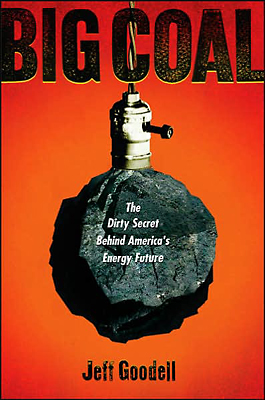

| BIG COAL The Dirty Secret Behind America's Energy Future Jeff Goodell Boston: Houghton Mifflin, 2006 |
Rating: 5.0 High |
|||
| ISBN-13 978-0-618-31940-4 | ||||
| ISBN-10 0-618-31940-9 | 324p. | HC/BWI | $25.95 | |
A native of the Santa Clara Valley before it became Silicon Valley, Jeff Goodell is a contributing editor at Rolling Stone. He spent three years writing this book. He interviewed coal company executives and coal miners and ordinary citizens. He rode coal trains across the midwest. He spent a month on a research vessel in the North Atlantic. He visited West Virginia and Wyoming and even remote Xinjiang in China's far west — realizing in the course of that odyssey that he with his computer, and everyone in America who uses electricity, is to some degree complicit in the ravaging of America's coal-bearing regions by the mining companies. But this in no way excuses the companies' greedy and rapacious practices — not when they could mine just as much coal without despoiling the land and destroying the lives of the people who live on it.
"The coal industry tends to see people who live near mineable coal seams as people who are standing in the way of progress, as if their right to profit from digging out these ancient black rocks supersedes every other right, including the right of future generations to imagine what the Appalachians looked like before they got leveled. The issue is not really whether we have enough coal to provide enough electricity to keep our air conditioners cranked up. The issue is, how big a part of America are we willing to sacrifice for this privilege?" – Page 19 |
Today we face a powerful triumvirate. The coal companies, the railroads, and the energy companies in the U.S. depend on profits from mining, hauling, and burning the black rock. Change, of any sort, cuts into their profits. So they resist change, and with the political clout they've built up over decades, they are largely successful. See Big Coal's Taboo
Our task, based on our own self-interest, is to convince them that their true self-interest lies in embracing the changes that reduce greenhouse gases while there is still time to change without excessive disruption.
In this well-researched account, Jeff Goodell shows us why this is so. He shows us the coal industry from the inside. He takes us to once-thriving coal towns like Masontown, Pennsylvania where an old coal-burner called Hatfield's Ferry keeps the lights on, the houses covered with soot, and the residents choking. With a mine cave-in survivor, he delves into an old, underground mine to give us a glimpse of what it's like to work in "dogholes." He visits a modern strip mine. He lets us ride along on Engine 9722 as it laboriously pulls a line of cars loaded with coal out of Wyoming's Powder River Basin and across the midwest. Most tellingly of all, he revisits the industry's origins, showing us how Thomas Edison's fledgling power company evolved into the financial and political colossus we know today.
A sense of history is vital to understanding this complex picture. Begin where Goodell does, with an out-of-work Englishman named Samuel Insull. Through one of those James Burkean connections, he becomes Thomas Edison's personal assistant, and winds up in charge of a Midwestern coal empire. It's thanks to Insull that we depend on a few suppliers of electricity running enormous central plants fed by caravans of mile-long trains carrying thousands of tons of coal daily — all nominally regulated "in the public interest" by government agencies whose staffers are too frequently beholden to the companies they are charged with overseeing.
Statistics are essential, and this book provides them. But in every worthwhile investigation of this industry I've read, the author highlights the people involved. Jeff Goodell does this better than most. He introduces us to Maria Gunnoe, struggling to raise two kids alone in Boone County, the poorest county in West Virginia; to Randy Fogle, going back in the hole after escaping a cave-in at Pennsylvania's Quecreek Mine because it's in his blood; to the crew of Number 9722, barrelling down the ribbon rails. Of course he provides the factual information required to convey the big picture: the figures on coal production, salaries and profits, emissions of pollutants, and the like. And of course he describes the words and actions of the bigwigs who drive the coal mines and electric utility companies. But it is portrayals of people like Gunnoe and Fogle, drawn with the spareness and clarity of a good writer, that make this book stand out in memory.2
This very readable book is divided into three parts, titled in trenchant wise: The Dig; The Burn; The Heat. It has a thorough set of endnotes and a competent index. Because his ambition led him to become a writer and journalist, hence away from extensive study of science and engineering, I can forgive his very few goofs on technical subjects (like implying there are 94 natural elements.) He's a good researcher and a good writer. He's so good, in fact, that I want to "share the wealth." So I'm introducing a new feature of my reviews here — a listing of the books a favored author has written.3 Jeff Goodell has five to his credit. Brief citations are given in the box to the right.
Also, because I have more to say about the subject of this book, I hold forth in the page linked above in the sidebar and just below, which I call "Big Coal's Taboo."

 To contact Chris Winter, send email to this address.
To contact Chris Winter, send email to this address.